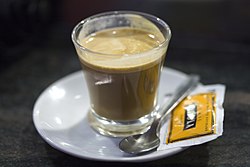Cortado
 Cortado from Catalonia, Spain | |
| Type | Hot, Cold |
|---|---|
| Country of origin | Spain |
| Color | shades of brown, white |
| Ingredients | espresso, milk |
A cortado is a Spanish beverage consisting of espresso mixed with a roughly equal amount of warm milk to reduce the acidity,[1][2] although the exact ratios have considerable regional variation.[3] The milk in a cortado is steamed, but not frothy and "texturized" as in many Italian coffee drinks.[4] The cortado is commonly served all over Spain.[5] The word cortado is the past participle of the Spanish verb cortar (to cut), in the sense of "dilute", and can refer variously to either coffee or espresso drinks throughout Spanish and Portuguese speaking countries.
Similar drinks
In Spain a café solo corto is a small amount of black coffee (usually a single shot of espresso), while a café cortado or more commonly just a cortado is an espresso with a splash of milk. The term cortado is itself broadly associated with various coffee or espresso beverages having been "cut" with milk. The cortado is very similar or the same as the Italian macchiato or the French noisette.
The cortadito in Cuba specifically implies a small beverage similar to the café solo corto consisting of a standard 30 mL (1 US fl oz) espresso shot; however, unlike the solo corto, the Cuban cortadito is generally cut with heated sweetened condensed milk, being a more available preserved form of milk, as fresh milk was historically often unavailable. A cortadito is usually served in a special glass, often with a metal ring base and a metal wire handle. There are several nominal variations, including cortado condensada, café con leche condensada or bombón (espresso with condensed milk); leche y leche is a similar variation, but with both condensed milk integrated throughout and a dollop of cream resting on top. Brought to the Little Havana neighborhood of Miami, Florida, by Cuban-Americans in the 1960s, the cortadito drink is now found throughout the city, and is an important part of everyday culture, particularly among Cubans. However, the cortadito is a drink distinct from Cuban-style coffee, which includes sugar in addition to milk, and has its own brewing method as espresso.
In non Spanish-speaking countries where it appears on a specialty coffee menu, however, the cortado should generally be distinguished from the Italian caffè macchiato, cappuccino, or a flat white.[4] A macchiato has only a small amount (a 'mark' or spot) of milk foam added, while a cappuccino has a head from both foam and milk.[2] A flat white is generally made with a similar equivalent ratio of espresso to milk, but uses steamed and textured (e.g. microfoam) milk, resulting in a hotter and lighter drink, more closely related to a caffè latte.[4]
A similar drink in Australia is known as a piccolo latte, or simply a piccolo.[6] This is a single ristretto shot in a macchiato glass that is filled with steamed milk in the same fashion as a cafe latte. A larger drink, popular in Portugal, is the galão, which uses 1:3 proportions but is otherwise similar to both cortados and manchados.
Other names and variations
In Catalan, tallat takes the role of describing being cut, with the closest word in Basque being ebaki, and pingado or garoto in Portuguese. In the United States the meaning of the name can vary by region but on the East Coast it is generally known as a cortado. In the Czech Republic, Costa Coffee sells cortado under the marketing name corto classic.[7]
Gibraltar
The name gibraltar originated in San Francisco, California, where roasters – first Blue Bottle Coffee Company, later Ritual Coffee Roasters and others – started the cortado trend by serving the drink in Libbey Glass Company glassware by the same name.[2][8] Whereas a cortado is a broader term for many a cut beverage, a gibraltar is specifically defined in its proportions by the constraints of its cup size: a Libbey "Gibraltar" glass contains 135 mL (4+1⁄2 US fl oz), 60 mL (2 US fl oz) of which are filled by a standard double espresso shot and the remainder filled by foamy steamed milk. While some sources assert there is no distinction between a gibraltar and a cortado,[9] establishments that offer both drinks generally differentiate the gibraltar with a richer, more velvety texture and a cooler, lukewarm temperature.[citation needed]
-
A gibraltar, served in San Francisco
-
A diagram of coffee drinks in Silicon Valley, showing an archetypal gibraltar
See also
References
- ^ Nguyen, Tien (February 10, 2011), "Drink This Now: Cognoscenti Coffee's On-the-Menu Cortado", LA Weekly, archived from the original on February 13, 2011, retrieved July 29, 2012
- ^ a b c Strand, Oliver (March 4, 2010), "A Cortado Is Not a Minivan", T: The New York Times Style Magazine
- ^ Kanniah, Janice Chinna (March 2, 2020). "What Is a Cortado?". Perfect Daily Grind.
- ^ a b c Shilcutt, Katharine (August 8, 2013), "What's The Difference Between a Flat White and Cortado?", Houstonia
- ^ Hoffmann, James (2018). The World Atlas of Coffee 2nd Edition. Great Britain: Mitchell Beazley. p. 117. ISBN 978-1-78472-429-0.
- ^ "What is a Piccolo Latte?", Cafe Culture, August 15, 2011, archived from the original on August 9, 2019, retrieved August 3, 2014
- ^ "Nápoje" [Drinks]. Costa-Coffee.cz (in Czech).
Corto classic. Jemná a krémová káva, ze dvou shotů směsi Mocha Italia, s mléčnou pěnou zdobenou technikou latté art.
- ^ Daniel Young (March 2009), Gibraltar, San Francisco's Cult Coffee, Comes to London, archived from the original on January 20, 2016
- ^ Peleg, Oren (June 8, 2017), "So, What's the Difference Between a Flat White, a Cortado and a Cappuccino?", LAist
External links
 The dictionary definition of cortado at Wiktionary
The dictionary definition of cortado at Wiktionary

